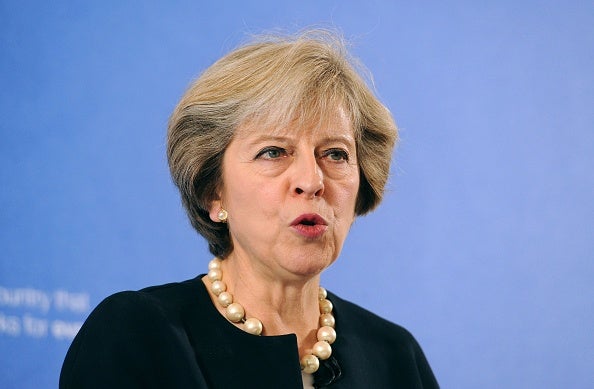Theresa May has to ignore the House of Lords on Brexit - but she does so at her own peril
The House of Lords committee demands that MPs and peers should approve the invoking of Article 50, and with their pro-EU majority they are going to make life very difficult for Theresa May


On the face of it, Theresa May’s first two months as Prime Minister have gone remarkably well. She provided vitally-needed reassurance and stability amid the turmoil of the Brexit vote. If ever the country needed a safe pair of hands, this was the moment. “Imagine it if had been Boris or Andrea Leadsom,” one of their ministerial “colleagues” remarked this week.
By dumping David Cameron’s policies and people, May has left no one in any doubt that we have a newly-minted government. The Labour Opposition is absent without leave, and the parliamentary boundary changes published this week will make its electoral mountain even steeper.
Although things could not have gone much better for the new Prime Minister, her allies wonder when her honeymoon will end. It is dawning on them that May also has a mountain to climb. It is called Brexit and will dwarf everything else, even a welcome diversion over grammar schools and economic news that ministers fear will get worse at some point.
Little progress seems to have been made over what the Government wants Brexit to mean, notably the crucial trade-off between curbing EU migration and the resulting loss of access to the European market. The clock is ticking. Although some voices advocate delaying formal talks until after the French election next spring or even the German one next autumn, May is unlikely to do so. It would enrage impatient Brexiteers in her own party and the other EU leaders with whom she has to negotiate an already difficult divorce settlement.
The biggest threat to May lies at home, and in Parliament. A foretaste of the deep trouble ahead came on Tuesday when a cross-party House of Lords committee demanded that MPs and peers should approve the invoking of Article 50 of the EU’s treaties, which triggers a two-year Brexit negotiation. Downing Street was quick to dismiss the call. In itself, the peers’ warning shot is not much of a threat, and May will find a way to consult Parliament on Article 50 without giving it a veto. Although a small number of MPs and peers insist Parliament has the constitutional right to block Brexit and seem in denial about the referendum vote, the vast majority who live in the real world now accept that any PM who ignored the result would soon be toast.
However, the flexing of muscles in the Commons and Lords is ominous for May. The real crunch will come when the fraught EU negotiations are under way. Significantly, the Lords Constitution Committee also demanded full consultation with Parliament during the EU talks as well as the right to “agree and adopt” the final outcome.
The crucial battle will be the level of access to the European single market after leaving the EU. Europhobes in the Cabinet and on the Tory back benches are already lobbying for a “hard Brexit” with the UK outside the single market. But Open Britain, the successor to Stronger In, the Remain campaign in the referendum, is pushing hard for the retention of full market access. It is not re-fighting the last war or seeking a second referendum like Owen Smith, the Labour leadership challenger, who seems to be in the “denial” camp. He has suggested he might try to take Britain back into the EU after Brexit, even if that meant joining the euro and the “open borders” Schengen agreement. I don’t think that would play too well at a general election.
Open Britain has inherited more than 500,000 supporters, 70 per cent of whom say their priority is the economy and staying in the single market. It accepts that the country voted for a change on immigration but wants to “mend not end” free movement. It wants the Government to look at limiting free movement to those who have a concrete job offer and a sector-by-sector “emergency brake” on EU migration if it causes unemployment or depresses wages.
The group will build a grassroots network to lobby MPs to press for the closest possible trading links. It already has cross-party support, and more Tory MPs ready to go public – another ominous sign for May. The former Home Secretary’s instincts may be to look at the EU deal through the migration end of the telescope. But many MPs – and the Treasury – will urge her not to sacrifice market access vital for jobs and investment. It is believed 480 out of 650 MPs voted to Remain in June. Although the vast majority now accept we will leave the EU, many will fight for as much market access as possible. There will be similar pressure in the Lords. Although the unelected second chamber is an unlikely place to challenge the people’s verdict, its stance will embolden MPs. The Government does not have a majority in the Lords, where the 253 Tory peers can be outvoted by the (pro-EU) 314 Labour and Liberal Democrats. So it is quite possible that both Houses will vote for a degree of market access that May will struggle to deliver because of her desire to meet the public’s instruction to clamp down on EU migration.
May regards as unfinished business her failure at the Home Office to cut net migration to anywhere near the Government’s foolish target of under 100,000 a year. But persuading a majority of MPs and peers to endorse free movement curbs that would severely restrict EU market access might prove very tricky indeed.
May’s negotiations with the other 27 EU nations will be fraught enough. Her other negotiation – with Parliament – could be even more difficult.

Join our commenting forum
Join thought-provoking conversations, follow other Independent readers and see their replies